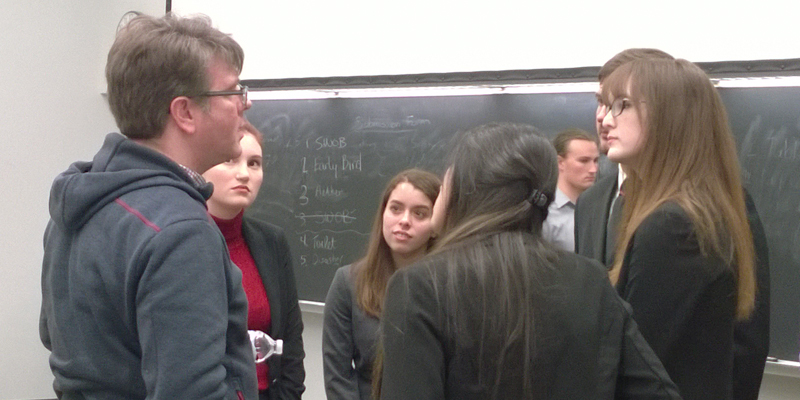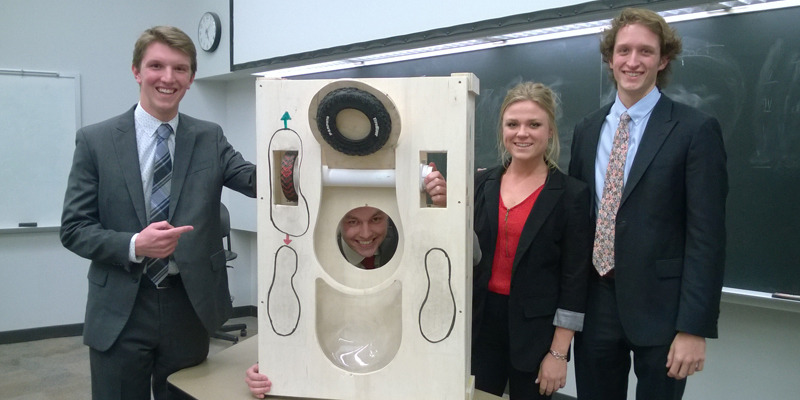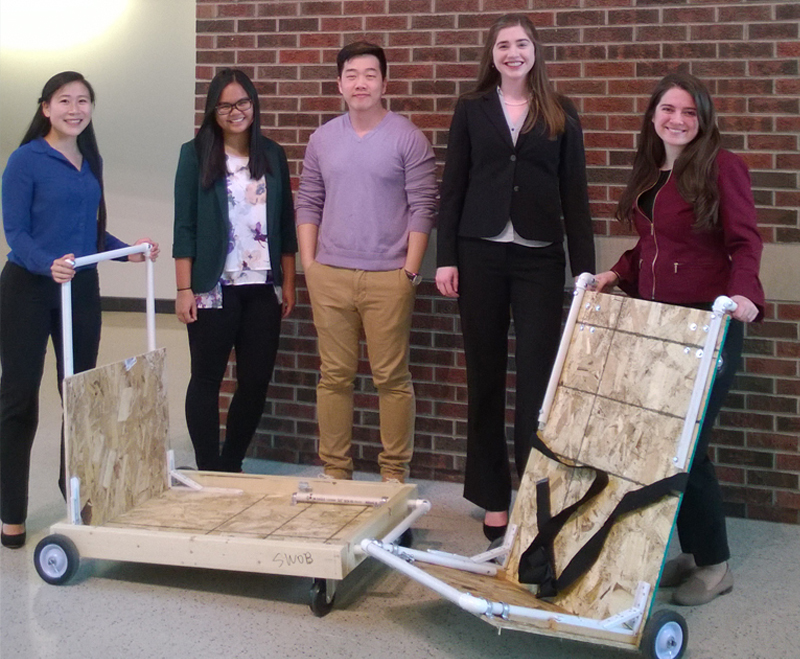Capstone Design in Multidisciplinary Engineering
Capstone Design Course
All students enrolled in the Multidisciplinary Engineering Program (MDE) have opportunities to learn about and practice engineering design through their coursework. All MDE seniors must demonstrate acquired skills and make use of their acquired knowledge through a major culminating design experience referred to as “Capstone Design." MDE capstone design courses, and any pre-requisite course to an approved MDE capstone course, must be successfully passed with a C- or better to meet graduation requirements. This experience is the ultimate opportunity for students in the program to provide evidence that they are prepared for work in engineering practice.
Courses eligible to meet the requirements for Capstone Design in the Multidisciplinary Engineering program are limited (see an Advisor or Curriculog for details). In general, here are some attributes of a Multidisciplinary Capstone Design course:
- Design challenge is inherently multidisciplinary, meaning design success will require perspective taking from a wide variety of engineering and non-engineering domains. In practical terms, this also means that students can expect to work on diverse teams that contain a variety of MDE program concentration areas.
- Design challenge is purposefully open-ended, meaning there in no one (single) “right answer” or solution to be designed. In practical terms this means that given a design scenario and certain constraints, students will need to successfully research to identify a central design need as well as users and key stakeholders to design with/for, specify design criteria, use math, science and engineering coursework to develop, analyze, test, iterate, improve upon and deliver their design concepts using physical, virtual, modeled and/or simulated artifacts and working prototypes.
- Design challenge is complex. In practical terms, this means that students must invest significant time and energy at the individual level, to ensure that the design team is successful in delivering a substantial solution, well backed up with ample, robust evidence to support the suggested design solution.
All students must take their Capstone Design course on the Purdue West Lafayette campus and successfully complete it to be eligible to meet degree requirements.
Capstone Design Challenge
Capstone Design challenges may include local or global contexts; specific industry partners/clients, or draw upon local government and not-for-profit communities of need; or be tied to some theme or current event or could be far reaching and imagine a future need. Examples of prior design challenges include a design for “temporary” shelter, a design for a novel lighting application/need, a design for a mobile business application/need (IDE48500), a design for a special acoustics need (ECE40020), and a design for a Special User group (EPICS).
Spring 2023 Cohort Design Challenge
- How can we help increase mobility for elderly people, reduce the stigma behind using devices to help with mobility, and makes those devices more accessible?
- How can we prevent people from experiencing detrimental effects to their health due to noise pollution, increase awareness of the dangers of noise pollution to people who live in urban areas, and make noise pollution solutions affordable?
- How can we increase user agency in regard to identifying and speaking about mental health warning signs, training and resources?
- How can we prevent crab traps from being lost or forgotten (contributing to ocean waste and ecosystem damage)?
Spring 2019 Cohort Design Challenge
Design for Safety
- Early Bird Caseworker; Early Notification App
- Mechanism to easily and hygienically capture human waste to convert to community biogas
- Modular building units for modular building
- Multipurpose, convertible transport cart
- Human powered air filtration unit for polluted underprivileged geographies
Team DD&I searched for safety solutions for people who may struggle living with mental illness. Rethinking how social media data might be put to work for a positive purpose, this team envisioned an Ap that could be put passively to work. Engaging a wide variety of wellness, law enforcement, cyber security, and policy professionals, this team designed, developed and tested a fully functioning application which used lack of activity data on social media, as a user approved means for reaching out to their “circle of trust” for possible gentle intervention and follow up with their friends and family that may be struggling.
Team Land Speed used their own personal and professional motorsport experience, along with the experience of AAE Faculty John Sullivan, to envision a safer design and riding experience for the electric powered motorcycles raced in the Bub Motorcycle Speed Trials at the Bonneville Salt Flats, UT. Safety improvements for this vehicle ranged from a safer battery box/restraint system to a detailed driver, safety and “pre-flight” check-list to ensure all systems are in order between races.
Team Consumer Goodies worked to address the regrettably common occurrence of theft from university dwellings. Motivated by improving the safety of all persons who rent their housing, this team worked to develop an Ap powered locking mechanism that could be retrofitted to any standard door and door knob configuration. A proximity switch recognizing ones cell phone means no college dorm room need be left accidently unlocked to fall prey to petty theft.
Spring 2018 Cohort Design Challenge
Designs for Temporary Shelter
- Anti-rape undergarment
- Steering wheelsafety device to detect drowsiness
- Mental illness "circle of trust" app
- Theatre rigging "brick buddy" counterweight guide
- Systems solution including enhanced equipment, analysis and processes for motorcycle racing driver safety
- Autolock mechanism for college dorm
Team EB demonstrates a fully developed application (App) now available in the Apple and Android Stores. The app called “Early Bird, helps case workers assist their constituents as they face difficulties associated with homelessness and incarceration. The tool was overwhelmingly accepted and will be implemented across Central Indiana to improve caseworker services and assist those affected and in need. of support.
Team Sanitation envisioned a more hygienic and sustainable solution for people living in 3rd world countries, whose use of “squat toilets” limited their health and human potential. Rethinking and developing a mechanism for protection from and collection of human waste, allowed for its conversion into useable methane gas. This team idealized an eco-viable means for powering communities around the globe, with a free and sustainable resource.
Team SWOB worked with a local food pantry, developing a specialty convertible food delivery cart. The light weight cart folds compactly into the storage trailer used for distributing food, and safely transports food to the consumer’s car. The efficient and cost sensitive design also allows the associated volunteers of the food pantry to load any pre-proportioned items within their delivery trailer with safety and efficiency in mind.



Stephen W. Pater Fund for Interdisciplinary Engineering Studies Capstone
In 2016, the Multidisciplinary Engineering Program received its first ever Purdue Alumni gift to help fund classroom-related efforts for instructing and magnifying the impact of the Multidisciplinary Capstone Design experience (prototyping costs, company visits to meet with experts, etc.). Through the generosity of Purdue alumnus Stephen W. Pater ('65, Aeronautics and Astronautics) a new endowment was created: the Stephen W. Pater Fund for Multidisciplinary Engineering Capstone. The gift allowed students to partner with Juno Lighting beginning with the 2017 cohort, and has paid forward in ways unimagined.
Last Updated: August 30, 2023



